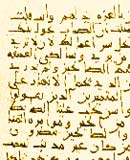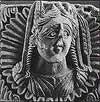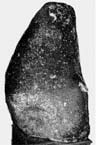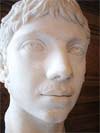Thought for the Day
"Instead
of a perpetual and perfect measure of the divine will,
the fragments of the Koran were produced at the discretion
of Mahomet; each revelation is suited to the emergencies
of his policy or passion; and all contradiction is removed
by the saving maxim that any text of Scripture is abrogated
or modified by any subsequent passage."
– Edward
Gibbon.
The
recorded revelations of the prophet were stored in a chest
in the custody of one of his wives. After Muhammad's death
these gems of wisdom and divine guidance were
collected into a sacred volume, subsequently edited under
the
instruction of caliph Uthman – quite a challenge for
twenty two years of 'thoughts'. The arrangement is
neither chronological nor thematic but simply (after a brief
prologue) from
longest to shortest. In the original Arabic it is, apparently,
extremely poetic, a charm lost in translation.
Multi-Sourcing – Muhammad's
'Pick'n'Mix' Message
As
the birth of literacy in a pre-literate society the
Koran contains no direct quotes from either the Old
or New Testaments – but the fables are painfully
familiar. |
From
Judaism:
Monotheism. God
('Allah' in Arabic) rules supreme. He is all-powerful,
all-knowing, and all-merciful – and alone.
But most of the time the Islamic god does not have Yahweh's 'humanoid'
characteristics. (Having
said that, Satan – aka 'Malik' – has
a place in the saga) |
From
Various Christianities:
John
the Baptist (Yahyá) – not merely
a fore-runner but a prophet. |
Mary
and her Virgin birth. |
Legends
of the Prophets. Throughout history (well,
semitic history) God has sent messages and laws
to 'prophets' to guide humanity.
New
twist: Muhammad is another – and last – such
prophet. A bright star announces his birth. Unlike
Judaism's prophets – sinners full of human
frailty – in Islam the same cast of characters
are paragons of piety and 'righteousness'. |
Jesus ('Isa')
is born of the Virgin Mary and is the Messiah of
the Jews, a great prophet (but only human and not
divine).
New
twist: baby Jesus' miraculously speaks from his
cradle and he fashions a living bird out of clay. New
twist: a substitute takes JC's place on the cross
therefore is not crucified but 'raised to heaven'
unharmed. |
Fables
of Origins.
First man, Adam, was expelled from Paradise for eating from the forbidden tree.
(New
twist: Satan appears but not as a serpent, both
Adam and Eve equally tempted, but repent and are
forgiven – and thus 'pains of childbirth'
not God's punishment of Woman.)
Righteous
man Noah built an ark to save a select few from a
flood brought on by the wrath of God.
New
twist: No inherited 'original sin'; children born
'pure'. No atoning blood sacrifice required. (Eat
your heart out, JC!) |
Rejection
of 'Trinity' (Christian orthodoxy
after 381).
New
Twist: the Trinity rejected is that of 'God,
Mary, Christ' – a source of huge derision
from Christian apologists but actually the doctrine
of an Arabian/Christian sect, the Collyridians.
Promise
of Eternal Paradise for Believers New
twist: considerably more alluring – for
men: 72 'houris' each! |

The church towers of Byzantine Syria – the
earliest minarets, square rather than round. |

A form of prayer with bowings and
prostrations copied from
the pew-less Christian churches found across the
Levant. |
Fables
of the Patriarchs & Biblical Heroes:
Includes Abraham (aka Ibráhím) and his son Ismá'íl
(Ishmael); story of sacrifice of Isaac (Isháq ) at God's bidding. Sura
37: 100
Lút
(Lot), Ya'qúb (Jacob), Yúsuf (Joseph),
Ayúb (Job). Hárún (Aaron), Dhu
l-kifl (Ezzekiel), Dawúd (David), Sulaimán,
Ilyás (Elijah), al-Yasa' (Elisha), Yúnus
(Jonas), Zakaríya (Zakariyah)
New
twist: prophets Hud and Saleh and the stories of
the people of Ad and Thamud (predictable tales
of rejected righteous prophets and divine retribution.) |
By claiming
descent direct from Abraham ('the first Muslim')
Islam trumps rival claims of precedence.
From
the tradition of Christian 'desert fathers' – both
the Arabia 'Hanifs' – monotheistic hermits – and
the later Sufi mystics .
|
Fable
of the Exodus:
Moses (Músa) led the Israelites out of Egypt and received a revelation
on Mount Sinai. Moses
quoted (though not always accurately) more
than one hundred times in the Koran |
Ramadan is,
in fact, nothing more than an Islamised Lent (the
eastern Christian churches still hold an all-day
fast.)
Divinely
sanctioned conquest
It became
the duty of every Muslim man to make war on unbelievers
O Prophet! Strive against the disbelievers
and the hypocrites! Be harsh with them.
Their ultimate abode is hell, a hapless
journey's end.
– Surah
9.73
O ye who believe! Fight those of
the disbelievers who are near to you,
and let them find harshness in you. – Surah
9.123 |
|
Fixed
Law embodied in scripture: Preaching an end
to licentiousness and need for peace, justice and
social responsibility, Muhammad advocated improving
the lot of slaves, orphans, women and the poor,
and replacing tribal loyalties with the fellowship
of a new monotheistic faith - which he called Islam,
meaning 'surrender to God.'
Mosaic
laws about circumcision and ablutions to
be obeyed; prohibition against eating pork, interdiction
of images. New
twist:When Muhammad gave up on the Jews the Sabbath
was changed to Friday and the direction of prayers
changed from Jerusalem to Mecca. |
Friday Gathering: "Islam
enjoins Muslims to gather every Friday for communal
worship. This practice had
evolved in Medina where Jews had gathered on Friday
for the weekly market before the Saturday Sabbath."
(Bloom, Blair, Islam p109)
|
In most
Islamic cities the congregational mosque was/is located
in the town centre, within or close by a large market
('suq' or bazaar). Unlike Jews or Christians, Muslims
are required to stop work only during the communal
prayer, not for the entire day. |
Judgement
Day. God will bring about the end of the world
and the Day of Judgment. |
|
Paganism
Just
like Christianity, Islam owes a debt to paganism.
Paganism is part of its theology, history, ceremony,
and veneration. |
Black Stone:
About
60 BC, the Roman historian Diodorus Siculus commented
that there was in Arabia a temple 'greatly revered
by the Arabs.'
Ptolemy, the geographer, mentions
it in his work, calling it the 'macoraba.'
Muhammad
incorporated the Kabah's pagan roots into
Islam to give the Muslims a sense of identity,
legitimacy, and uniqueness. He also wanted to ease
the Arabs' strain of moving from paganism to Islam,
by continuing the practices of their fathers. New
twist: The Ka'bah of Mecca was built not to honour
the black meteorite but Abraham himself, who
supposedly built a shrine on the same spot – (Sura
3:97) |
Muhammad
keenly recognized the religious and economic importance
of retaining the pilgrimage to Mecca.
There
were 360 idols around the Kabah (a connection
with the celestial orb seems clear). Paintings
of Jesus and Mary were said to have been on the
inner wall of the Kabah.
 |
The
black stone of Mecca. Actually now in several pieces. |
|
Allah’s
Daughters:
When facing resistance from the polytheistic Quraysh tribe Muhammad appears
to have wavered in his monotheism. At one stage he commanded his followers
to offer prayers to 'Allah's three daughters' – al-Lat, al-Uzza,
and Manat, each of which had a shrine near Mecca.
"These
are the exalted cranes Whose intercession is
to be hoped for." (Surah 53:19-22)
He later
retracted that particular 'revelation' and blamed
it on a trick by the Devil – hence, the
'Satanic Verses.' |
The
goddess Manat ('Fate') seemingly has a ghostly
presence in Islamic 'fatalism' – the perception
that everything is under God's control. |
|
Islam's "Dead
Sea Scrolls"?
Muhammad's
'divine revelations' were apparently memorized
by his followers or inscribed on camel
shoulder bones, leather and wood. Not until 650 – 40
years after the earliest – were the various
utterances ('suras') compiled into a single Koran
commissioned by caliph Uthman and issued as the
'authorized' version throughout his empire.
It
seems that in the Himyarite kingdom in the
south heterodoxy had flourished ...
|
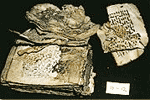
|
Yemeni
7th/8th century Koranic fragments
Discovered
in 1972 during restoration of the Great Mosque
of San'a, tens of thousands of fragments of a
thousand early Korans – and not all
of them identical.
Could
it be Islam's 'Word of God' – like the
Christian version – needed a little judicious
editing??
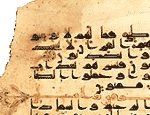
|

Great
Mosque of San'a, Yemen, originally built
705-715. |
|
|
Part
One
Sources:
W. Cook & R. Herzman, The Medieval World View (OUP,
1983)
John Gribbin, Science a History (Penguin, 2003)
William Dalrymple, From the Holy Mountain (Flamingo, 1998)
N. H. H. Sitwell, Outside the Empire-The World the Romans Knew (Paladin,
1984)
Edward Gibbon, Decline & Fall, Chapters 50-52 The Coming of Islam,
Arab Conquests
M. Brett, W. Forman, The Moors, Islam in the West (Orbis, 1980)
Justin Wintle, History of Islam (Rough Guides, 2003)
J. Bloom, S. Blair, Islam - Empire of Faith (BBC Books, 2001)
J. J. Norwich, Byzantium, The Early Centuries (Viking, 1988)
C. McEvedy, The Penguin Atlas of Medieval History (Penguin, 1987)
Robert Marshall, Storm from the East (BBC Books, 1993)
skeptics
annotated quran
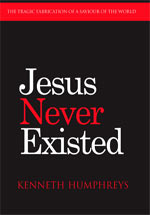
|
 |

|

|
Some fifty articles are now available as a book.
For your copy order:

|
|
Copyright © 2004
by Kenneth Humphreys.
Copying is freely permitted, provided credit is given to the
author and no material herein is sold for profit.
|
